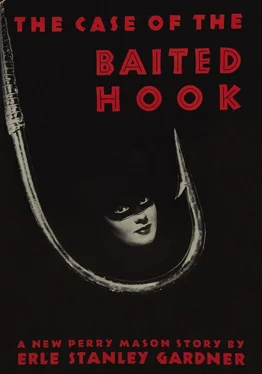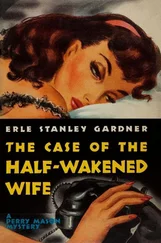“What makes you think he gave me carte blanche?”
“Obviously,” Mason said, “one does not get messages from a dead man.”
“You think that he is dead then?”
Mason said, “The circumstantial evidence uncovered by the police would point that way.”
“He was alive and well at nine o’clock last night.”
“You know that?”
“Yes.”
“You talked with him?”
“Yes.”
“Over the telephone?”
“I don’t care to answer that question.”
Mason said to Della Street, “I think you’d better call Sergeant Holcomb of the Homicide Squad, Della, and tell him we have a witness who knows something about Robert Peltham.”
“You can’t do that,” Adelle Hastings said.
“Why not?”
“It wouldn’t be fair. Mr. Peltham retained you.”
“Not to protect him,” Mason said, “to protect a woman.”
“Who was the woman?”
Mason said, “Mr. Peltham took steps to conceal her identity from me.”
She said, “I know now what you were referring to when you talked with me before — intimating that I had something to give you.”
“Do you indeed?” Mason said, his voice showing only polite interest.
Della Street said, “Do you wish me to put through that call now, Chief?”
“Please,” he said.
Della Street asked Adelle Hastings, in her most polite manner, “May I use the phone?”
“You may not,” Miss Hastings said. “I’m not going to have the police brought into this.”
Mason said, without looking around, “You’ll find a telephone at the drugstore on the comer, Della. You have a dime?”
“Yes.”
She arose, put her cigarette in an ash tray, said, “Excuse me, please,” and opened the door.
It was not until she had stepped out into the corridor and was about to close the door behind her that Adelle Hastings called, “Stop,” in a voice that was harsh with strain.
Della Street stopped.
“Come back,” Adelle Hastings said. “I’ll tell Mr. Mason what he wishes to know.”
Della Street stepped back into the apartment, closed the door, and stood with her back against it, her hands still holding the doorknob. Adelle Hastings tried unsuccessfully to blink back tears. She said to Mason, “Don’t you ever give an adversary an opportunity to save her face?”
Mason said, “I’m sorry, Miss Hastings. I deal in results. I care little for methods.”
“So I’ve observed,” she said. “I think, Mr. Mason, I could learn to hate you with very little effort.”
Mason’s tone was detached and impersonal. “Many people hate me.”
“I’ll tell the truth,” Adelle Hastings said wearily. “I’m cornered. I have to. Robert Peltham came to me nearly two weeks ago. He told me he was satisfied there was something wrong with the administration of the trust fund. I didn’t believe him at first, but he called my attention to certain significant facts. He said that for personal reasons it was impossible for him to take the initiative. He suggested that I do so.”
“You did?”
“I made some preliminary investigation.”
“And then?”
“Then,” she said, “last Monday night — Tuesday morning to be exact — at about three o’clock in the morning, Mr. Peltham called me on the telephone. He said he had to see me at once on a matter of the greatest importance.”
“At that time, you’d taken steps to see that there was to be a complete investigation?”
“Yes.”
“And what happened?” Mason asked.
She said, “Peltham told me that Albert Tidings had been murdered, that the circumstances surrounding the killing were such that he would be accused of the murder. He seemed very much upset.”
“Did he mention anything to you about a woman?” Mason asked.
“Not directly, but I gathered that he hadn’t been alone at the time of the shooting.”
“Did he admit to you that he had shot Tidings?”
“No.”
“What else?” Mason asked.
She said, “Peltham told me that it might be some time before Tidings’ body was discovered, that under no circumstances must I ever admit to a soul that I had any intimation that he was dead, that I must go ahead just as though Tidings were alive, that I must continue to push things, that it was vital to him that it be definitely established there was a shortage in Tidings’ accounts before the public knew of the murder.”
“Did he say why?”
“No.”
“What did you tell him?”
“I told him that I’d do it. He’d been fair with me, very truthful, and very candid. I trusted him.”
“Did he say anything else?”
“He told me to see that my time could be accounted for — in case that should become necessary.”
“In other words, he expected that you might be accused of the murder.”
“I don’t know. He didn’t say. He only told me that, and I didn’t ask him why.”
“But you knew why, didn’t you?”
She hesitated a moment, then faced him defiantly, and said, “Yes.”
“That’s better,” Mason said. “Now then, you arranged to keep in communication with Peltham?”
“Yes.”
“How?”
She said, “Mr. Peltham didn’t actually leave town. He went to a little hotel and registered under the name of Bilback. I kept in communication with him.”
“By telephone?”
“Both by telephone and in person.”
“What happened last night?”
She said, “I went to see him.”
“He was in his room?”
“Yes.”
Mason glanced at Della Street. “And did you,” he asked, “call him after you read the paper this morning?”
“Yes, of course.”
“With what result?”
She said, “I was advised that Mr. Bilback hadn’t been seen this morning — that he wasn’t in his room.”
Mason said, “You’ve gone to a lot of trouble in this case keeping me groping in the dark.”
She smiled. “I was trying to protect Mr. Peltham,” she said. “Under the circumstances, you can appreciate my position.”
“That was your only reason?”
“Why, yes, of course.”
Mason said, “On Monday night Mr. Tidings had an appointment with a woman, a woman who was in a position to cause him a great deal of trouble. When he left his office, he was in a hurry to keep that appointment.”
Her face was a studied mask.
Mason said, “Suppose you tell us about that appointment, Miss Hastings.”
“I don’t know what you mean.”
Mason said, “I’m warning you, and I’m warning you for the last time.”
She blinked tears back from her eyes.
Mason consulted his wrist watch. “You have exactly thirty seconds,” he said.
She waited for ten seconds, then said, in a voice that was choked with emotion, “I saw him.”
“Where?” Mason asked.
There was another interval of silence, then at length she said, “Here.”
“Not here,” Mason said. “On the turntable out by Mrs. Tidings’ bungalow. He asked you to meet him there. He didn’t want to be seen coming to your apartment. You’d already accused him of being short in the trust accounts. He said that if you’d meet him there, he’d explain everything.”
She shook her head in tight-lipped silence.
“Where,” Mason asked, “did you meet him?”
“Here.”
Once more Mason crooked his elbow so that he could consult his wrist watch. “Thirty seconds,” he said.
The room became uncomfortably silent. At the end of twenty-five seconds, Adelle Hastings stirred and inhaled a quick breath, as though getting ready to speak. Then she clamped her lips again into dogged silence.
Mason got to his feet. “Come, Della,” he said, and held the door open to let her precede him into the corridor. Then he turned to face the motionless form of Adelle Hastings sitting mutely on the chair. “Remember,” he said, “you had your chance.”
Читать дальше












